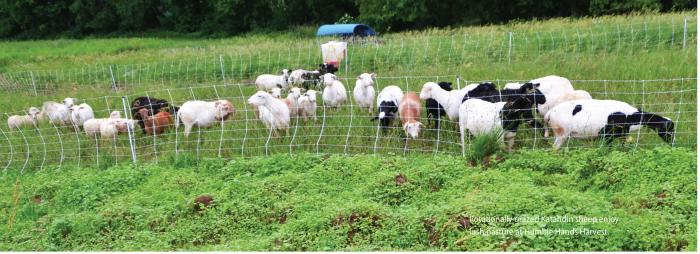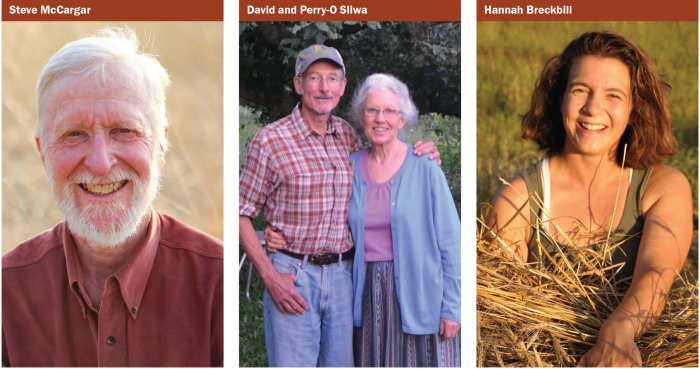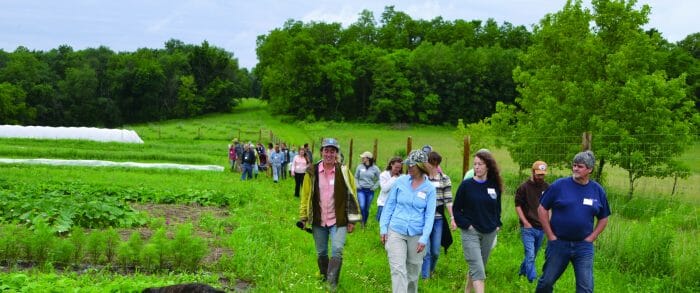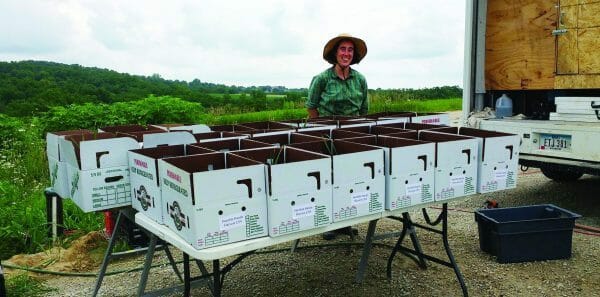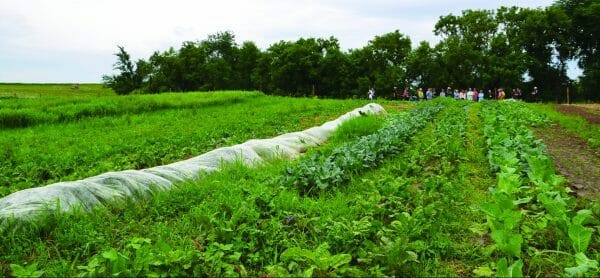From Land Protection to Land Access
In 1982, when Steve McCargar and his wife, Heidi Swets, moved to Decorah, they didn’t really know anybody. But they knew it was a beautiful area and there was a food cooperative (Oneota Community Food Cooperative), so they purchased a 35-acre plot of land on what is Hidden Falls Road and built an off-the-grid house. Nearly 40 years later, Steve knows just about everybody. His strong connection to the community has allowed him to bring together people with a common vision to help create an opportunity for young farmers to build a farm that puts community at the center of life.
When Steve learned in early 2014 that 22 acres of land next to his home was slated for auction, he was concerned. A few years before, a similar property up the road went up for auction and the top buyer was a farmer who intended to build a large hog operation on the site. When the landowner realized it, he stopped the bidding and decided to retain the land. While the hog operation didn’t end up happening, the prospect of a possibly drastic land conversion taking place next door was disconcerting. “That it was going to be an auction raised all kinds of alarm bells for me,” Steve says. “There’s just no way we could let that happen.” He and the other neighbors were concerned for air and water quality. The local ecosystem is sensitive due to the steep slopes; clean, cold water with diverse fish species; and karst topography susceptible to groundwater contamination. He immediately began thinking of ways to purchase and protect the land.
Shortly after he learned of the auction, Steve attended the annual meeting for the Northeast Iowa Peace and Justice Center, in January 2014. As co-manager of the Oneota Community Food Cooperative for many years, he had led a major fundraising effort to expand the store. As a result, he knew some people at the annual meeting, and that they had financial resources and would likely be interested in protecting the land. After the meeting, Steve gathered a group together and described the situation. There was an immediate outpouring of support: The community members there pledged $45,000 towards purchasing the property. Steve called more friends, built more support and within a month, he had cobbled together the $121,000 in commitments necessary to buy the property.
“We knew Hannah wanted to own her own land, and this was a way to help her access land.” – Perry-O Sliwa
But who would actually own the land? He decided to call on his friend and Decorah lawyer, Karl Knudson, for help organizing the ownership structure. “We want to do something unique, and we want you to be the legal horse that we ride to get it done,” Steve recalls telling Karl.
Karl told the group they had a few options: They could form a partnership, a corporation or a limited liability corporation, but that an LLC made the most sense. “LLCs can have a lot more informality,” Karl says. “You don’t have shares of stock that you have to be keeping track of.” Also, when and if parties with ownership interest in the LLC wish to sell, they can do so without having to do a title search or ensuring the deed is recorded.
Importantly for this group, it was easy for the founders to make stipulations through an operating agreement – similar to bylaws – that was put in place at the time the LLC was created. Those stipulations could also be amended at any time by its members. Steve says the group imposed several restrictions related to how the land would be used – like prohibiting certain chemicals and by-products from being applied to the land.
In February 2014, Hidden Falls, LLC was formed by 16 households and shortly thereafter purchased the land. The farm is at the end of Hidden Falls Road, which Steve also had a hand in naming. As county supervisor in the early 1990s, when a 911 street address system was being implemented to improve emergency response, he helped property owners name roads if they petitioned the county. Since Hidden Falls Road contains several hidden waterfalls, Steve and his neighbors rallied and submitted the name.
David and Perry-O Sliwa also live nearby, and were among the original shareholders of the newly formed LLC. Perry-O says no one in the group was eager to take on additional expenses after having purchased the land, so shareholders looked for ways to generate income off the property. The land had been in continuous corn production, but the group found a local farmer to rent the land for making hay. “Hay seemed like a kinder use of the land,” Perry-O says. “It does haul off lots of nutrients, but at least it wasn’t going to be putting more chemicals on the land.” Still, the group needed a long-term plan – not everyone wanted to keep the land, and some of the shareholders initially also wanted to enroll the land into the Conservation Reserve Program (CRP).
Humble Hands
Hannah Breckbill had a solution that would make everyone happy. Hannah grew up in Lincoln, Nebraska, but has been farming or working on farms from Texas to Minnesota since 2009. She has carefully planned for the future of her farm business, taking part in the Land Stewardship Project’s Farm Beginnings and Journeyperson programs, and in PFI’s Savings Incentive Program. She first moved to Decorah in 2010 to work with Chris Blanchard at Rock Spring Farm, and later worked briefly at Seed Savers Exchange.
While Steve was rounding up interest in purchasing the land near his home, Hannah was operating Humble Hands Harvest across the border in Minnesota, the farm she started in 2013. Despite being out of state, she had maintained her connections to the Decorah community. The same week Hidden Falls, LLC was forming, Hannah just happened to be riding in a car with Steve’s daughter (also named Hannah), who mentioned the newly forming group and the story of the land. A few weeks later, Hannah wrote a check to become one of the shareholders.
“I was just lucky enough to get in on it early,” Hannah says. “I happened to talk to the right person during the right week.” Because she was an original shareholder, she was able to have input into the decision-making that would guide the land’s future. “If it had gone to CRP, I wouldn’t have been able to farm the ground.”
After two years farming in Minnesota, Hannah moved her farm to Iowa. In both cases, however, she was farming on rented land. To make the infrastructure investments needed for the farm’s long-term stability, she knew she needed to own the land. As a partial owner of the land in Hidden Falls, LLC, she had always hoped to relocate her farm there someday. At least some of the LLC shareholders were strong supporters, chief among them Perry-O Sliwa. “We knew Hannah wanted her own land, and this was a way to help her access land,” Perry-O says.
In 2016, after a rough year in which many of the vegetable fields flooded on the land she was renting near Decorah, Hannah started working to purchase 8 acres of the farmland through the LLC. She used her own savings, as well as savings-match funds she had earned through Land Stewardship Project’s Journeyman’s Program and money borrowed from family to buy some of the shares. For the rest of the funds, she relied on the generosity of the community.
The shares she purchased were sold to her at a discount. Perry-O and David Sliwa, who had known Hannah for several years, gifted her their shares. “Working with the LLC wasn’t always easy, because I was proposing something pretty different than what many shareholders had anticipated,” Hannah says. “But since everyone’s ideals were in alignment, I felt supported – and we have always come around to a solution that works for everybody.”
“Working with the LLC wasn’t always easy, because I was proposing something pretty different than what many shareholders had anticipated. But since everyone’s ideals were in alignment, I felt supported – and we have always come to a solution that works for everybody.” – Hannah Breckbill
The Sliwas, who operated Sliwa Meadow Farm for years near Decorah, were eager to support Hannah’s vision. “We’re pretty excited to see someone who’s young, intelligent, energetic and going beyond what we think of as a good caretaker of the soil, a good caretaker of the neighborhood,” Perry-O says. “I have such respect for Hannah and the ideas she puts out, the way she puts them out and how she invites others into her vision.”
A Cooperative Vision
Hannah views farming as a community effort, and soon invited her second cousin, Emily Fagan, to cooperatively operate Humble Hands Harvest. After completing a season of training at Patchwork Green Farm in 2017 through PFI’s Labor4Learning program, Emily was looking for a place to start her own farm. Together, she and Hannah started to build infrastructure and grow vegetables on the land Hannah purchased from Hidden Falls, LLC. To help fund their infrastructure plans, Hannah and Emily held a “farm-raising” party and launched a GoFundMe campaign. The local community rallied once more: Those efforts, along with in-person donations, raised $20,000 – enough for a deer fence, well, greenhouse, cooler and delivery van.
In keeping with Hannah’s belief in communal involvement in the farm, she and Emily made plans to establish cooperative ownership of the farm. In 2017, they restructured Humble Hands Harvest from a sole proprietorship to an LLC, to allow joint ownership and decision-making.
Financially, they structured the donations and gifts to stay with the cooperative, rather than go to them directly. In their internal accounting system, Hannah and Emily each maintain their own capital accounts to keep track of what they have invested. The cooperative also has its own capital account that Hannah and Emily call “the commons,” where the equity is held for assets that have been gifted or donated to the operation. “If we were to disband Humble Hands Harvest,” Hannah says, “there would be the question of what to do with that money. We just put in our bylaws that we would re-gift it to some mission-based farm.”
In addition to deciding where the shared equity would go, Hannah and Emily had to decide what would happen to their personal equity if one of the partners left the cooperative. They decided that the person who left would receive her personal capital investments, which would be paid out over a determined period of time. “Basically, we would continue to get paid back our monthly salary until it hit what we contributed,” Emily says. If that payback method ends up being unfeasible, invested capital will be paid back in other ways.
To govern all of these processes, Emily and Hannah established an operating agreement, modeled on a sample agreement for a worker-owned cooperative created by the Sustainable Economies Law Center, a non-profit based in Oakland, California, that helps with legal issues related to community resilience and grassroots economic development. Hannah finds the operating agreement helpful to know what to do if there’s a conflict or when issues arise. “It’s a super important part of having a functional, working relationship,” she says. “I would recommend it even for people who are married.”
Planning for Growth – And Beyond
Emily officially bought into the cooperative in 2018, with the purchase of 3 acres of shares from Hidden Falls, LLC. She was gifted another acre, and Hannah purchased 1 more acre as well, increasing the farm’s size to 13 acres. With this expansion, Hannah and Emily are ready to add another partner to the farm. They recognize that finding the right business partner requires patience. Once they find someone, they plan to test the three-way partnership over a trial period – they foresee it being a year, or more if needed – so everyone has a chance to see if the match will fit. “We would ask a new cooperative member to contribute some capital,” Hannah says. “We decided on $5,500 as that amount, because that’s the cost of an acre.”
Hannah and Emily have discovered that the worker-cooperative model works for them because they have similar expectations and values. They want their farm to be something bigger than themselves – something that will live on beyond their own time in the cooperative. Hannah says, “We have a transition plan for our farm built into the founding document, which feels really valuable, because I see so many farms that don’t have that plan. Our transition plan favors beginning farmers and people who are willing to do what we have done.”
Seeing how the formation of Hidden Falls, LLC has benefited Hannah and Emily in their quest to farm, Hannah is now working on a project to bring together others who share interests similar to those of the original stakeholders. She envisions a sort of investment group or cooperative that can help acquire land and lessen the barriers for beginning farmers to start farming. She realizes there are many details to figure out, but is excited to lend her support to others looking to value the land and provide good food to others.

